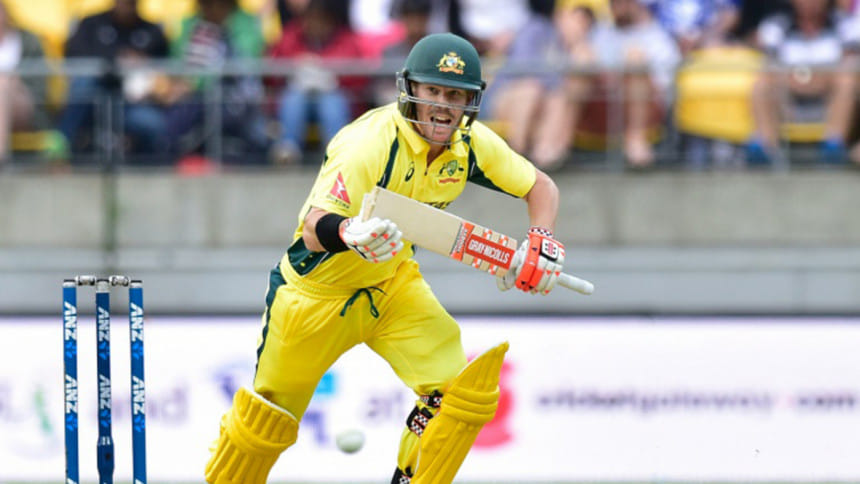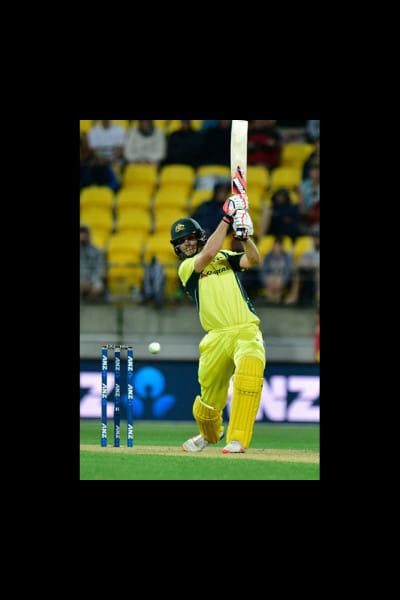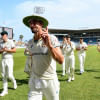Warner, Marsh ace Australia's 282 chase

Mitchell Marsh and John Hastings kept their heads after others before them had lost their own to wrestle Australia back into the Chappell-Hadlee series with a four-wicket victory over New Zealand in Wellington.
After David Warner and the recalled Usman Khawaja motored to an opening stand of 122 in pursuit of 282, a slide of 6 for 75 had put Brendon McCullum's team within touching distance of the series trophy. But Marsh's power and Hastings' composure were enough to reel in the remainder of the target and provide a valuable steadying win for the tourists, after five consecutive defeats across both limited-overs formats.
That Australia had been chasing a target of fewer than 300 was down largely to a much improved performance with the ball and in the field. Marsh and Hastings made key contributions there also, while the legspinner Adam Zampa bowled well in his first international match to claim the wickets of Kane Williamson and Grant Elliott.
Williamson made a smooth 60, but it was a late innings partnership of 61 from 44 balls between Mitchell Santner and Adam Milne that added heft to the innings after the Australians had claimed regular wickets throughout the afternoon. Santner's three wickets included those of Khawaja and Warner, either side of two wickets in as many balls by the emerging Matt Henry.
In his three previous ODI appearances, Khawaja had only ever hit one boundary, and as if to make up for lost time, his first ball from Trent Boult sped through square leg to start correcting that ledger. Warner was no less eager to get bat on ball, and together they formed an ideal union of artistry and aggression.
Khawaja's placement was deft with the odd boundary, epitomised by one pull shot that sent the square leg umpire Billy Bowden sprawling in his 200th ODI appearance. Warner's power was demonstrated when Santner dropped short and was shovelled shudderingly beyond the rope at long on.
So comfortable did Khawaja seem that it was a surprise to everyone in the stadium when he played too soon at Santner and offered a return catch via the front edge of the bat. As wickets can often do, this one brought a marked change to momentum, and New Zealand's bowlers again homed in effectively on Steven Smith.
Having bowled Smith off the inside edge at Eden Park, Henry coaxed a deflection off the outside edge this time, which Luke Ronchi caught wonderfully diving where first slip might have been. Next ball, George Bailey was late and crooked on a fast nip-backer, leaving Glenn Maxwell to survive the hat-trick ball but drag Boult fretfully onto the stumps 11 runs later.
Through all this Warner remained imperious, surging to the cusp of a century. But Santner's persistence was rewarded when he landed a ball in line and found enough turn to beat Warner's forward stroke. The LBW appeal was vehement and the review, after Bowden rejected it, successful. Australia's stocks sank further when Matthew Wade failed to clear the outstretched left hand of Milne at deep midwicket.

Hastings stepped up admirably in the absence of James Faulkner, working the ball around sensibly with the odd angry shot, guiding the younger Marsh towards the target. By the end, they had succeeded in playing so securely that the match was won in circumstances that felt anti-climactic - largely because Marsh and Hastings played so well.
Australia had made three changes to the team that was given a hiding in Auckland, dropping Shaun Marsh for Khawaja, while Boland came in for Kane Richardson due to back soreness, and the debutant Zampa was called up in place of Faulkner. Zampa had his ODI cap presented to him by Allan Border, and his chosen shirt number, 63, was in tribute to Phillip Hughes.
New Zealand were unchanged, in a match where they could complete a series victory over Australia for the first time since 2007. McCullum led a typically hyperactive start to proceedings, clattering 28 from 12 balls including a six off each of the Australian pacemen.
Boland's very first ball was sent flying back over his head and into the sight screen, but he responded well by pulling back his length and being rewarded when McCullum charged again and was bowled. That wicket scotched much of the early momentum, even if Martin Guptill and Williamson moved along smoothly enough for the next 11 overs.
It was Marsh who broke the stand, prompting a miscue from Guptill when he tried to force the pace a little more. The chance swirled out towards deep cover, where Khawaja showed excellent judgment to claim a catch more difficult than it appeared. Marsh had another victim when Henry Nicholls, called up to the Test team this week, wafted at a wide delivery: New Zealand had stalled.
Williamson and Elliott formed another useful stand without ever looking in total command. This was in part due to the thoughtful work of Zampa, who varied his pace artfully to keep the batsmen guessing. His reward would come in consecutive overs, as first Williamson then Elliott pushed catches to cover trying to manufacture boundaries.
That put New Zealand five down, and regular wickets from there prevented the hosts from pulling together a total of the dimensions they managed at Eden Park. Santner and Milne pulled back some of the ground in the closing overs, but the tourists could be happier with their effort. Ultimately the task would prove just within the reach of Australia's batting order, leaving all to play for in Hamilton on Monday.

 For all latest news, follow The Daily Star's Google News channel.
For all latest news, follow The Daily Star's Google News channel. 








Comments